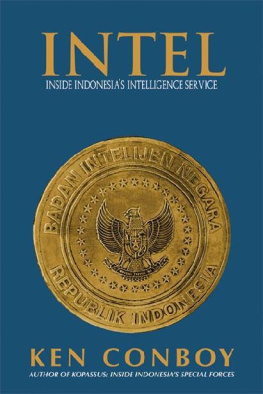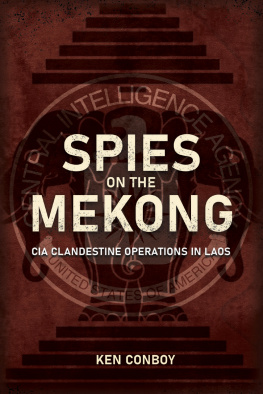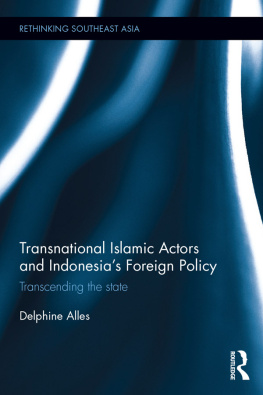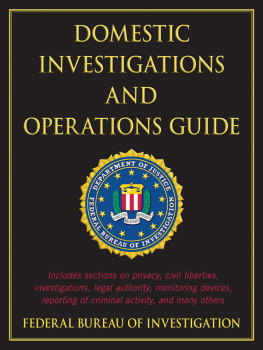INTEL
Inside Indonesias Intelligence Service
Ken Conboy
Equinox Publishing (Asia) Pte Ltd
No 3. Shenton Way
#10-05 Shenton House
Singapore 068805
www.EquinoxPublishing.com
ISBN 979-97964-4-X
First Equinox Edition 2004
All rights reserved.
Contents
Preface
In October 2003, an officer from Indonesias State Intelligence Agency ( Badan Intelijen Negara , or BIN) stared at the young, goateed Asian sitting in a bare Karachi cell. Composed and well spoken, Gun Gun Rusman Gunawan motioned with his manacled hands to emphasize a point. The younger brother of Hambali, Southeast Asias most infamous terrorist, Gun Gun had been detained by Pakistani authorities on 1 September. Ironically, the tip that led to his arrest came from his elder sibling, who had been captured in Thailand three weeks earlier.
What Gun Gun revealed under interrogation underscored the adaptability of the latest breed of international terrorists. He had led a cell of nearly two-dozen Asians six Indonesians, the rest Malaysians who had ventured to Pakistan in 2001 ostensibly to study at Islamic boarding schools. Calling themselves al-Ghuraba Arabic for The Foreigners their curriculum was, in fact, only partially religious. During their summer break in 2002, for example, they busied themselves perfecting counter-surveillance techniques learned from an Indonesian who had earlier trained in Afghanistan. Several of the al-Ghuraba members, too, lobbied to partake in the sectarian struggle in neighboring Kashmir.
The ultimate goal of al-Ghuraba was to return to Southeast Asia and lead the next generation of regional jihadists. But prior to that, in retaliation for his brothers arrest, Gun Gun planned for his cell members to kidnap an American executive in Karachi and hand him over to al-Qaeda; that plan was thwarted by the timely arrest of the remaining cell members in late September.
Despite those arrests, BIN could hardly rest easier. After all, al-Ghuraba had been hiding in plain sight for two years without arousing attention. Worse, an estimated one hundred additional Indonesians were enrolled in Karachi boarding schools known for their radical jihadist cirricula. BINs campaign against religious extremism was obviously not going to be concluded anytime soon.
Indonesias intelligence service, of course, far predates the war on terrorism. Here, for the first time, the full story of BIN and its predecessor agencies is chronicled in a detailed, objective account. It is important for this story to be told for several reasons. First, it puts contemporary Indonesian history in a more nuanced and pragmatic light. The New Order regime of President Suharto took pains to portray itself as being diplomatically neutral during the Cold War. In fact, its intelligence services were exceedingly aggressive in countering communist diplomats on Indonesian soil. By understanding this, Indonesias role in the second half of the twentieth century can be placed in better perspective.
Second, while dozens of books about the CIA and KGB are published each year, it is rare for an intelligence agency in the developing world to be documented in such rich operational detail. Indeed, this is the first time that such a book about a Southeast Asian intelligence organization is available to the public. These operational details will allow historians to better understand intelligence operations during the post-World War II era.
And lastly, BIN has been at the forefront of Indonesias war on terrorism even before 11 September 2001. While some aspects of this clandestine campaign have been leaked to the media, this book provides far more details than previously available.
Looking ahead, BIN can only retain its prominent role in countering the legion of challenges faced by the Republic of Indonesia. Its regional branches will keep a finger on the pulse of tensions in the provinces, especially in troublespots like Aceh and Papua. Its agents will gather information on drug smugglers and currency counterfeiters. And a large number of its officers will continue playing a lead role in countering terrorists both domestic and foreign that continue to foster deadly attacks across the archipelago. It is hoped that this history will allow BINs influence and capabilities in these areas to be better understood and appreciated.
This book is based upon both written sources and oral interviews. To the extent possible, oral sources have been identified in end notes; some interviews, especially among serving intelligence officers, must remain anonymous. Special thanks go out to Lieutenant General (retired) A.M. Hendropriyono, who was extremely generous with his time and extraordinarily supportive of efforts to chronicle the history of the agency he now oversees. Without exception, BINs other senior officials also went out of their way to offer insights and comments. Strong thanks, too, go to Mark Hanusz and John Hanusz for the yeomans effort they gave in editing and producing this volume.
Despite such support, it must be stressed that this work is an unofficial history and does not necessarily reflect opinions within BIN. As a courtesy, BIN officials were allowed to see a draft of this book for their comments. Upon review, they requested two omissions each consisting of a single word to protect sources and methods. In both cases (on pages 190 and 246) these items were redacted.
Although all books are a collaborative effort, the author takes responsibility for everything in these pages. Any errors in fact or interpretation are my own.
Ken Conboy
Jakarta, December 2003
Tip of the Iceberg
As Indonesias first spymaster, Zulkilfi Lubis hardly looked the role. Born in Aceh one day after Christmas 1923 as the fifth of ten children, the slight, bespectacled Lubis shunned sports as a youth. Even his complexion soft, porcelain white and voice equally soft, almost effeminate conspired against any hint of machismo.
In the classroom, however, Lubis more than held his own. By the time he graduated junior high in 1941, good grades earned him a berth at a reputable senior high school in the Javanese cultural capital of Jogjakarta. The following year, when the Imperial Japanese pushed across the Indonesian archipelago, they immediately recognized his scholastic potential: not only did the 18-year old Lubis make an early cut for militia training, but in early 1943, he was among the first Indonesians selected as an officer cadet for a Japanese-controlled local auxiliary force known as Defenders of the Homeland ( Pembela Tanah Air , or Peta).
In Peta, Lubis got his first exposure to the fundamentals of intelligence. In Tangerang, a town on the outskirts of Jakarta, the Japanese had established a local version of their famed Nakano military intelligence school; Lubis was among its first graduates. Following this, he was posted in mid-1944 to Japans regional intelligence center in Singapore. There, he absorbed not only theory, but also practical applications: among the best lessons were those drawn from a Japanese intelligence officer who recited tales of conquering the French in Indochina largely through a psychological warfare campaign, rather than force of arms.
By the time of Japanese capitulation in August 1945, Lubis could claim more wartime intelligence experience than any other Indonesian. Rushing back to Jakarta, he linked up with former Peta colleagues most of whom were now throwing their weight behind an independent Indonesian Republic and mused aloud about the need to create an intelligence capability for the new state. He was openly supported in this endeavor by two former Japanese officers, neither of whom was particularly anxious to surrender to the Allies or return to their homeland.









